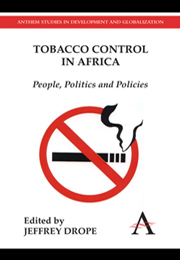Book contents
- Frontmatter
- Contents
- List of Figures and Tables
- Foreword
- Preface
- Acknowledgments
- List of Abbreviations and Acronyms
- 1 Introduction
- 2 The Political Mapping Process
- 3 Progress on Smoke-Free Policies
- 4 Taxation as a Tobacco Control Strategy
- 5 The Challenges of Implementing Bans on Advertising, Promotion and Sponsorship
- 6 The Pursuit of Packaging and Labeling Requirements
- 7 Burkina Faso
- 8 Cameroon
- 9 Eritrea
- 10 Ghana
- 11 Kenya
- 12 Malawi
- 13 Mauritius
- 14 Nigeria
- 15 Senegal
- 16 South Africa
- 17 Tanzania
- 18 Zambia
- 19 Conclusion: Tobacco Control in Africa – People, Politics and Policies
- Notes on Contributors
- Index
10 - Ghana
Published online by Cambridge University Press: 05 March 2012
- Frontmatter
- Contents
- List of Figures and Tables
- Foreword
- Preface
- Acknowledgments
- List of Abbreviations and Acronyms
- 1 Introduction
- 2 The Political Mapping Process
- 3 Progress on Smoke-Free Policies
- 4 Taxation as a Tobacco Control Strategy
- 5 The Challenges of Implementing Bans on Advertising, Promotion and Sponsorship
- 6 The Pursuit of Packaging and Labeling Requirements
- 7 Burkina Faso
- 8 Cameroon
- 9 Eritrea
- 10 Ghana
- 11 Kenya
- 12 Malawi
- 13 Mauritius
- 14 Nigeria
- 15 Senegal
- 16 South Africa
- 17 Tanzania
- 18 Zambia
- 19 Conclusion: Tobacco Control in Africa – People, Politics and Policies
- Notes on Contributors
- Index
Summary
Executive Summary
Despite considerable international activity in tobacco control, including shaping the Framework Convention on Tobacco Control (FCTC), comprehensive national legislation has been a struggle to achieve in Ghana. Accordingly, the most recent tobacco control efforts in Ghana, including the African Tobacco Situation Analysis (ATSA) initiative, have focused on advocating for national comprehensive legislation. Unfortunately, the legislation has been stalled for more than fi ve years. It is not clear how much support there is for the legislation in either the new cabinet or the national legislature. High-level changes in the health ministry have complicated these efforts, so the advocacy community has been once again regrouping to assess the potential for high-level support. In the interim, the tobacco control community has identifi ed other goals that may be more feasible in the short term. With comparatively low prevalence rates (approximately 5 percent) and a public generally compliant with informal tobacco control norms – particularly smoke-free public places of various sorts (e.g. hospitals, educational institutions, public transport, etc.) – a formalization of existing rules and regulations with an emphasis on enforcement could be sought concurrent to the pursuit of the broader legislation.
The Research and Development Division (RDD, formerly the Health Research Unit of the Ghana Health Service (GHS)) has been the principal leader of the ATSA team. While this unit is well-poised to conduct health research (it has strong ties to the Universities of Ghana and Nottingham) and public education, it has limitations, as an offi cial government entity, in advocating effectively for policy change.
- Type
- Chapter
- Information
- Tobacco Control in AfricaPeople, Politics and Policies, pp. 135 - 148Publisher: Anthem PressPrint publication year: 2011
- 1
- Cited by



